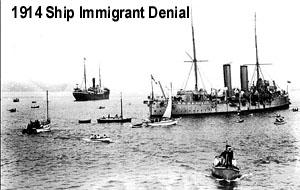
Canadian Internment:Like many European settlers, the Germans were faced with the hardships of forging an existence out of virgin wilderness. It was important to these German immigrants that they were able to practice their religion, educate their children and conduct their business in German. There was no opposition to this and a vibrant German community, a little bit of Europe, was transplanted in North America.The outbreak of World War I ended this. |

| The cozy relations between the British and Germans came to an end with
the onset of the first world war. As the war dragged on anti- German feelings
heated up. Germans were viewed with suspicion. The Dominion Government
passed the ‘Enemy Alien Act' which took away many of the basic rights enjoyed
by German Canadians: the right to vote, freedom of movement, etc.
Many had their businesses damaged and their homes vandalized. Thousands were interred during the war, suspected of being German spies. The effects of the war were to end much of what had been German in Canada. Although German speaking Canadians would remain the third largest group in the country, the German language was no longer taught in the schools. Church services were no longer held in German. Signs in towns were no longer written in German. The experiment of creating a European culture in Canada ended with the declaration of World War I. |
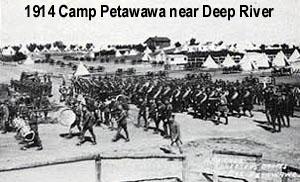
| WW I (Enemy
Alien Act, 1914 - 1924)
Before WW1 German Canadians did not question the compatibility of their customs and traditions with Canadian life. The First World War, however, changed all that. Overnight, Germans became Canada's most vilified people. Charged with treason and sedition, although no charge was ever proven, many were economically ruined and socially ostracized. Clubs and associations were dissolved, German schools closed, and German language papers suppressed. The Federal Government passed the ‘Enemy Alien Act', which stripped German Canadians of their right to vote, speak their language in public, and teach their children in German. Canadian towns with German names were renamed: Berlin, Ontario became Kitchener. More than 2,000 immigrants from Germany were interned. World War I had a devastating affect upon the German Community in Canada. The German sense of pride was replaced by feelings of anxiety and uneasiness and many German immigrants chose to jettison their identity in favour of Canadianism. |
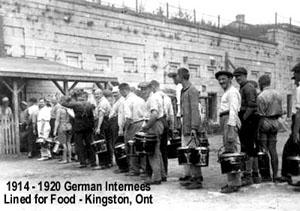 |
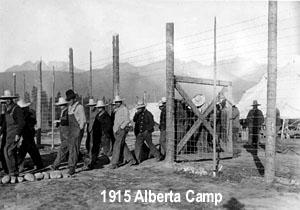 |
| WW II
Unlike the first war, only a few Germans were interred during WW2. Between 1939 and 1945 the Canadian government arrested and interned 837 German Canadian farmers, workers and club members deemed disloyal. There wasn't the same bitterness, however, the German community once again kept a low profile and tended to integrate within Canadian society. During the Great Depression, the door to all immigrants was closed. The next wave of German immigrants occurred between 1950 and 1960 when another 250,000 Germans arrived in Canada. By the year 2000, three million Canadians indicate German decent and continue to be the third largest ethnic group in Canada. Legacy
|
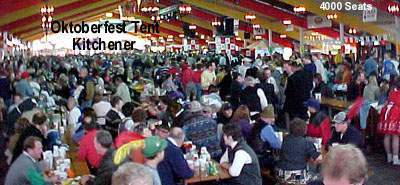
| Despite the diversity of origins within the German population, German Canadians have still managed to interact as a community. From Lunenburg, Nova Scotia to Waterloo County, Ontario and out into the western provinces, German communities of mixed backgrounds come together in many ways and in celebration of events symbolic of German heritage such as Oktoberfest Carnival and German Day. Kitchener is still home to a large German population and the German culture is still celebrated each year with Oktoberfest. |
|
|